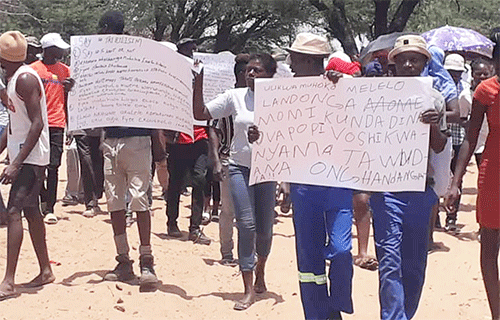The minister of urban and rural development, Erastus Uutoni, has urged all traditional leaders to ensure customary laws are clear and precise on succession to avoid disputes that commonly erupt after the chief or head of the traditional community dies.
He said this is one of the issues that place a huge burden on the state, and needs to be addressed as a matter of urgency.
Uutoni made these remarks during a courtesy visit at the palace of omukwaniilwa of the Ondonga traditional authority last week at Onambango village in the Oshikoto region.
The meeting was mainly aimed at information-sharing and a betterment of relationships between the ministry and traditional authorities. The minister said his office is concerned about the challenges of traditional authorities demanding that the ministry does what they (traditional authorities) are supposed to do.
Uutoni stressed that he ended up doing the work that he was not supposed to do, especially in matters of conflict resolution.
“Sometimes I send them back to their authorities, and to solve their issues since this has been a huge challenge to my office,” he reiterated.
The minister said many districts don’t have traditional authorities because of the conflicts which are taking place within their districts.
He, therefore, called on traditional leaders to respect the culture as it is supposed to be, rather than changing things.
“As a government, we are concerned about the mushrooming of traditional authorities, leadership succession battles, and disputes among traditional authorities. These scenarios create fragmentation and division among our people. This is contrary to the spirit of one Namibia, one Nation. Therefore, peace cannot reside in a house fraught with disagreement,” he stressed.
The minister further emphasised that the increased usage of the term “king and queen” in reference to traditional leaders is constitutionally and legally incorrect.
“Therefore, my recommendation for members of traditional communities and leaders is to utilise the traditional title, even when speaking English, to ensure that traditional titles are not diluted or enhanced,” he added.
Uutoni also urged all traditional authorities to continue exercising their traditional leadership roles in their communities by jointly fighting the social evils affecting society such as gender-based violence, tribalism, regionalism and corruption.
“I, therefore, urge you, esteemed traditional leaders, to practice transparency and fairness when appointing new leaders of a traditional community, people who have the public’s interest at heart, and not those who are after personal interests; people who will not circumvent statutory rules and procedures, and people who will advise you without fear, favour or prejudice,” he said.
Furthermore, the minister thanked the king of Ondonga for their agriculture project, which is currently progressing well. Omukwaniilwa of Ondonga Fillemon Shuumbwa Nangolo expressed concern over the rapid growth of towns, causing traditional authorities to lose land.
“The State should come on board and reconsider this issue of the town councils over the land of our authority. We never benefit from anything, and this makes it very difficult for the traditional authority to carry out its task,” he added.
The minister will be visiting all traditional authorities countrywide.
Caption: Exchange… Omukwaniilwa of Ondonga Fillemon Shuumbwa, chairperson of the Ondonga traditional authority John Walenga and the minister of rural development Erastus Uutoni.
Photo: Festus Hamalwa



